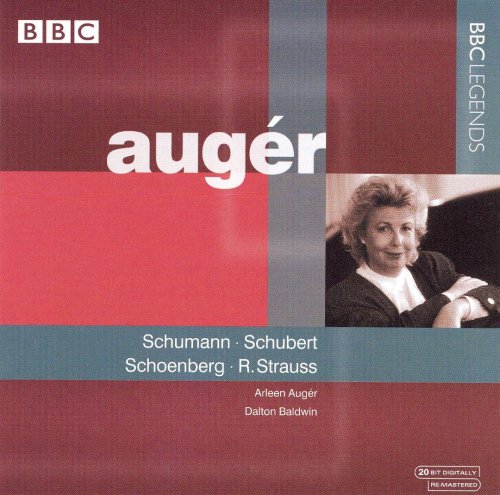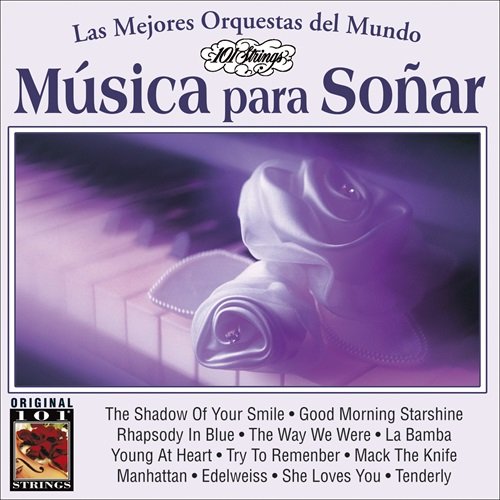Arleen Augér, Dalton Baldwin - Arleen Augér Sings Schumann, Schubert, Schoenberg, Strauss (2007)

Artist: Arleen Augér, Dalton Baldwin
Title: Arleen Augér Sings Schumann, Schubert, Schoenberg, R. Strauss
Year Of Release: 2007
Label: BBC Legends
Genre: Classical, Vocal
Quality: APE (image+.cue,log)
Total Time: 01:05:59
Total Size: 264 Mb
WebSite: Album Preview
Tracklist: Title: Arleen Augér Sings Schumann, Schubert, Schoenberg, R. Strauss
Year Of Release: 2007
Label: BBC Legends
Genre: Classical, Vocal
Quality: APE (image+.cue,log)
Total Time: 01:05:59
Total Size: 264 Mb
WebSite: Album Preview
1. Widmung ("Du meine Seele, du mein Herz"), song for voice & piano (Myrthen), Op. 25/1
2. Röselein, Röselein!, song for voice & piano, Op. 89/6
3. Er ist's ("Frühling lässt sein blaues Band"), song for voice & piano (Lieder-Album für die Jugend), Op. 79/23
4. Des Sennen Abschied ("Ihr Matten lebt wohl! Ihr sonnigen Weiden!"), song for voice & piano (Lieder-Album für die Jugend), Op. 79/22
5. Mignon ("Kennst du das Land, wo die Zitronen blühn"), song for voice & piano (Lieder-Album für die Jugend), Op. 79/28
6. Singet nicht in Trauertönen, song for voice & piano (Wilhelm Meister songs), Op. 98a/7
7. Frühlingsglaube ("Die Linden Lüfte"), song for voice & piano (3 versions), D. 686 (Op. 20/2)
8. Der Schmetterling ("Wie soll ich nicht tanzen"), song for voice & piano, D. 633 (Op. 57/1)
9. Nacht und Träume (Heil'ge Nacht, du sinkest nieder!"), song for voice & piano, D. 827 (Op. 43/2)
Claudine von Villa Bella, singspiel, D. 239
10. Ariette: "Liebe schwärmt auf allen Wegen", D 239 No. 6
11. Erster Verlust ("Ach, wer bringt die schönen Tage"), song for voice & piano, D. 226 (Op. 5/4)
12. Gretchen am Spinnrade ("Meine Ruh'..."), song for voice & piano, D. 118 (Op. 2)
Songs (4) for voice & piano, Op. 2
13. No. 1. Erwartung
14. No. 2. Schenk mir deinen goldenen Kamm
15. No. 3. Erhebung
16. No. 4. Waldsonne
17. Das Rosenband ("Im Frühlingsschatten fand ich sie"), song for voice & piano (or orchestra), Op. 36/1 (TrV 186/1)
18. Mohnblumen ("Mohnblumen sind die runden"), song for voice & piano, Op. 22/2 (TrV 153/2)
19. Die Zeitlose ("Auf frischgemähten Weideplatz"), song for voice & piano, Op. 10/7 (TrV 141/7)
20. Epheu ("Aber Epheu nenn' ich jene Mädchen"), song for voice & piano, Op. 22/3 (TrV 153/3)
21. Freundliche Vision ("Nicht im Schlafe hab' ich das geträumt"), song for voice & piano (or orchestra), Op. 48/1 (TrV 202/1)
22. Herr Lenz ("Herr Lenz springt heute durch die Stadt"), song for voice 7 piano, Op. 37/5 (TrV 187/5)
23. Heidenröslein ("Sah ein Knab..."), song for voice & piano, D. 257 (Op. 3/3)
24. The Serpent, for voice & piano
Arleen Augér’s recorded legacy is extensive, to say the least, and in a very wide repertoire. My first encounter with her voice was, I believe, when she sang a mermaid in the DG recording of Oberon, with Birgit Nilsson and Placido Domingo, among others. That was in the early 170s and her crystal clear and still warm lyric soprano greatly impressed me and made me hope to hear more of her. My prayer was granted. She will probably be best remembered for her Mozart but she sang so much else; one of my favourite recordings with her is Cimarosa’s Il matrimonio segreto, where she is a wonderful Carolina, having the same agility and face as Alda Noni on the old Cetra set but much more warmth.
Warmth, beauty of tone and ravishing pianissimo singing are also characteristics that distinguish her Lieder singing but besides these she possessed that harder-to-define quality that can be termed insight or communication, the ability to probe beneath the notes and convey not just the words but the deeper meaning of them. Early on while listening to this live recital I scribbled down ‘Seefried’ on my pad and it was gratifying to see Mike Ashman in his liner notes quoting the soubriquet ‘the true successor of Irmgard Seefried’. It isn’t so much a question of similarities of voices – at least not when comparing Seefried at roughly the same age as Arleen Augér here (48). Seefried, even in her early thirties, had a shorter range and when approaching her forties she could be sorely strained in the upper regions, but she had a unique way of making every song her own, to make an audience listen, accentuate a phrase or a word, saying: ‘Listen! This is important! This is something special!’, without overstating and distorting the text or the tone. Arleen Augér communicates in the same way on this well composed recital, often discreetly, even recessed, singing so to speak inwards, as a dialogue with the individual, not the whole audience as a collective.
The opening song, Schumann’s Widmung, at once tells us that this is going to be an intimate hour: soft, unaffected but with concentration and acuity. Röselein, Röselein! is ethereal and extremely beautiful, while the seldom heard Goethe setting Singet nicht in Trauertönen is light and springy, the piano accompaniment played with infectious bounciness by the excellent Dalton Baldwin. It is also good to have the three songs from Liederalbum für die Jugend, of which Mignon is especially impressive. It seems though that the track list has got the opus numbers wrong: Mignon is allotted Op. 79 No. 28, whereas it should be Op. 79 No 29 and the other two songs have both had the numbers displaced one step ahead. A bagatelle, but just to put the record straight. The correct numbers are shown in the heading to this review.
The Schubert songs are all superb and especially here Irmgard Seefried comes before my inner ear. Schönberg’s early (1899) Vier Lieder Op. 2, late romantic and mostly inward and soft, are also superbly done. They are not sung in the published order but the one indicated in the heading, which means that No. 3: Erhebung comes last, which is good for the applause since this is the only lively song. BBC have advised me that the correct sung order will be given on a sticker.
Everything superb so far, the Richard Strauss group is even better and it is extra valuable since there are a couple of songs rarely heard. The pick of the crop is probably Die Zeitlose, sung with silvery tone so perfectly attuned to Strauss’ music and the story is told intimately and with restraint. But Freundliche Vision, beautiful and inward, is also something for the desert island and – in total contrast – the lively, joyous Herr Lenz is like a refreshing Spring rain.
The well behaved audience crave encores and Arleen Augér satisfies with a simple an fresh-as-dew Heidenröslein and Lee Hoiby’s jazz influenced The serpent, rounding off one of the most satisfying song recitals I have heard for a long time. This disc will, I am sure, figure high on my list of favourite recordings of 2007. -- Göran Forsling
Warmth, beauty of tone and ravishing pianissimo singing are also characteristics that distinguish her Lieder singing but besides these she possessed that harder-to-define quality that can be termed insight or communication, the ability to probe beneath the notes and convey not just the words but the deeper meaning of them. Early on while listening to this live recital I scribbled down ‘Seefried’ on my pad and it was gratifying to see Mike Ashman in his liner notes quoting the soubriquet ‘the true successor of Irmgard Seefried’. It isn’t so much a question of similarities of voices – at least not when comparing Seefried at roughly the same age as Arleen Augér here (48). Seefried, even in her early thirties, had a shorter range and when approaching her forties she could be sorely strained in the upper regions, but she had a unique way of making every song her own, to make an audience listen, accentuate a phrase or a word, saying: ‘Listen! This is important! This is something special!’, without overstating and distorting the text or the tone. Arleen Augér communicates in the same way on this well composed recital, often discreetly, even recessed, singing so to speak inwards, as a dialogue with the individual, not the whole audience as a collective.
The opening song, Schumann’s Widmung, at once tells us that this is going to be an intimate hour: soft, unaffected but with concentration and acuity. Röselein, Röselein! is ethereal and extremely beautiful, while the seldom heard Goethe setting Singet nicht in Trauertönen is light and springy, the piano accompaniment played with infectious bounciness by the excellent Dalton Baldwin. It is also good to have the three songs from Liederalbum für die Jugend, of which Mignon is especially impressive. It seems though that the track list has got the opus numbers wrong: Mignon is allotted Op. 79 No. 28, whereas it should be Op. 79 No 29 and the other two songs have both had the numbers displaced one step ahead. A bagatelle, but just to put the record straight. The correct numbers are shown in the heading to this review.
The Schubert songs are all superb and especially here Irmgard Seefried comes before my inner ear. Schönberg’s early (1899) Vier Lieder Op. 2, late romantic and mostly inward and soft, are also superbly done. They are not sung in the published order but the one indicated in the heading, which means that No. 3: Erhebung comes last, which is good for the applause since this is the only lively song. BBC have advised me that the correct sung order will be given on a sticker.
Everything superb so far, the Richard Strauss group is even better and it is extra valuable since there are a couple of songs rarely heard. The pick of the crop is probably Die Zeitlose, sung with silvery tone so perfectly attuned to Strauss’ music and the story is told intimately and with restraint. But Freundliche Vision, beautiful and inward, is also something for the desert island and – in total contrast – the lively, joyous Herr Lenz is like a refreshing Spring rain.
The well behaved audience crave encores and Arleen Augér satisfies with a simple an fresh-as-dew Heidenröslein and Lee Hoiby’s jazz influenced The serpent, rounding off one of the most satisfying song recitals I have heard for a long time. This disc will, I am sure, figure high on my list of favourite recordings of 2007. -- Göran Forsling



![Noga - Heroes in The Seaweed (2025) [Hi-Res] Noga - Heroes in The Seaweed (2025) [Hi-Res]](https://www.dibpic.com/uploads/posts/2026-02/1771663366_nhs500.jpg)
![Tom Braxton - Flashback (2026) [Hi-Res] Tom Braxton - Flashback (2026) [Hi-Res]](https://www.dibpic.com/uploads/posts/2026-02/1771426129_1.jpg)
![Ragini Trio - 3 (2026) [Hi-Res] Ragini Trio - 3 (2026) [Hi-Res]](https://img.israbox.com/img/2026-02/19/uoki2dxo3dfz215xa2kz53gcp.jpg)
![Bei Bei - Two Moons (2025) [Hi-Res] Bei Bei - Two Moons (2025) [Hi-Res]](https://img.israbox.com/img/2026-02/19/j5lae93g4obtper3un20ilcnv.jpg)

